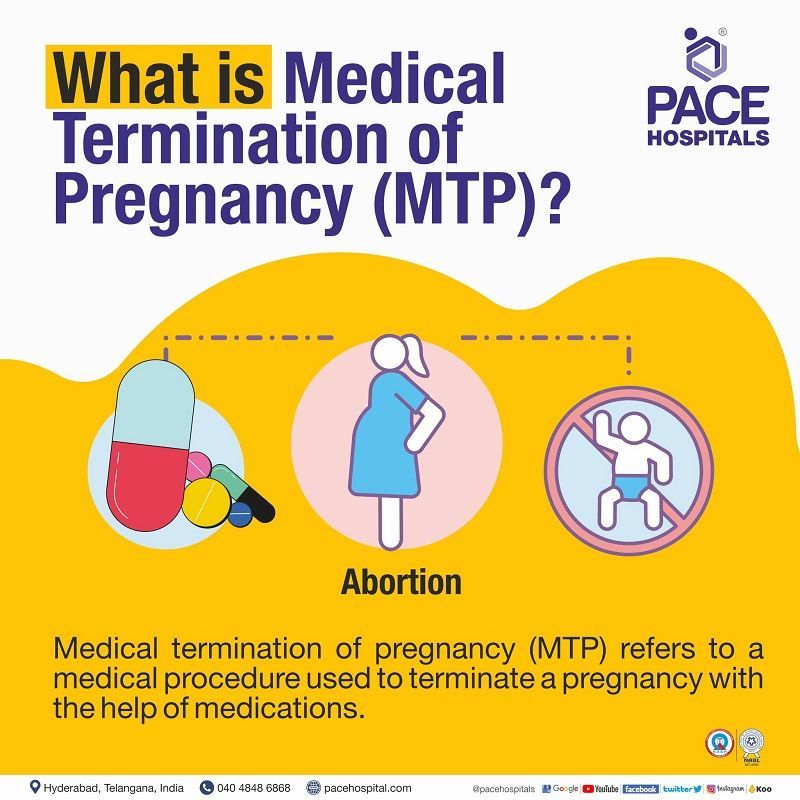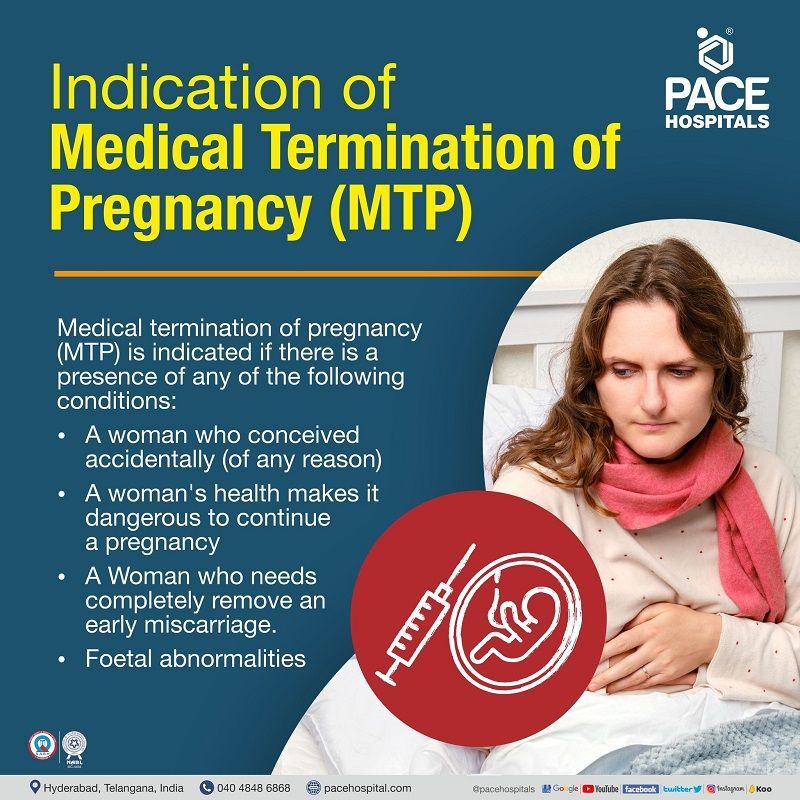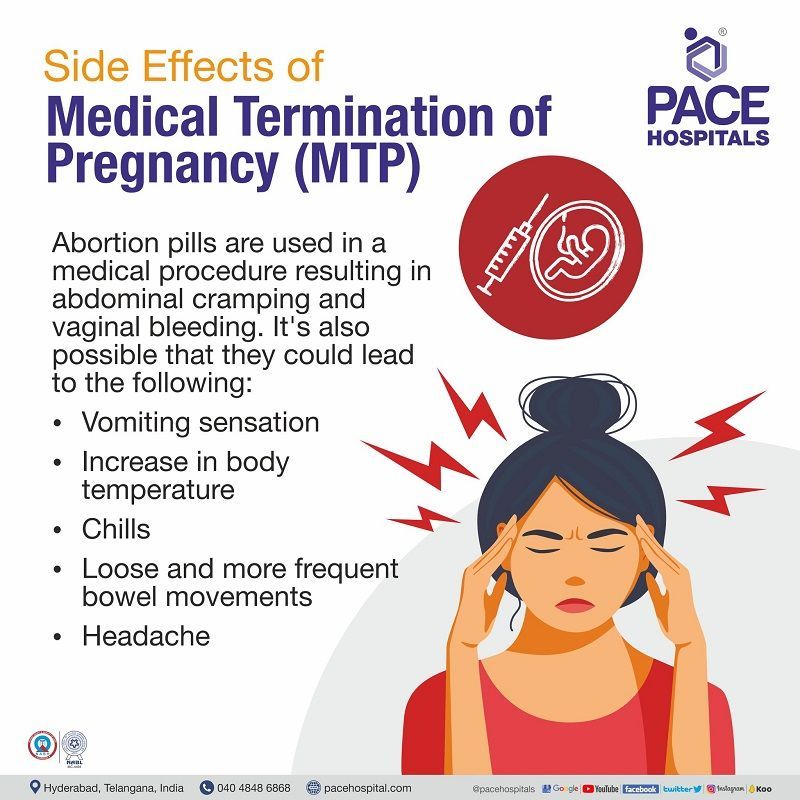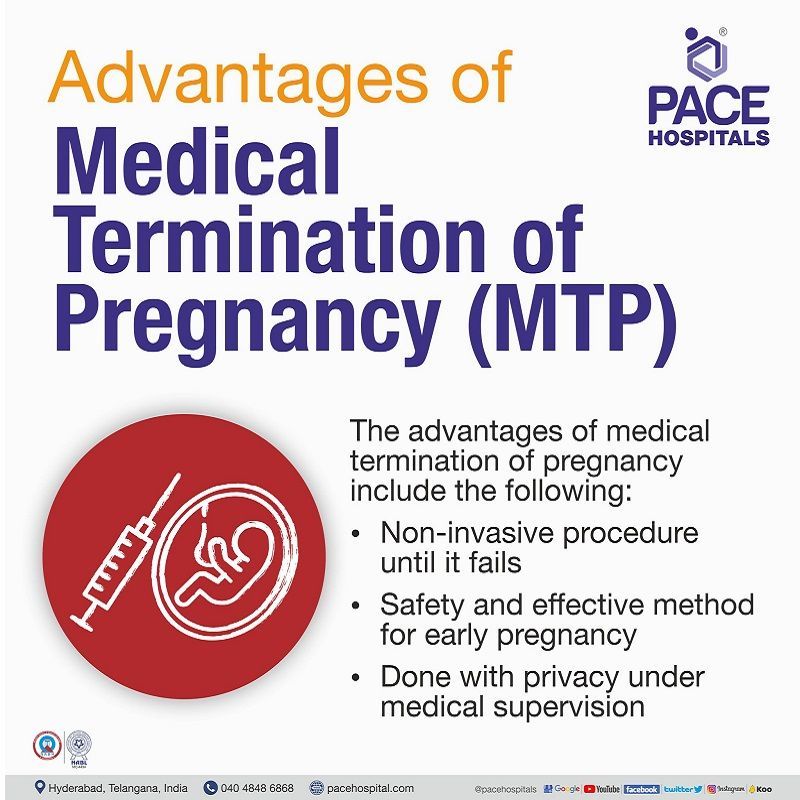Medical Termination of Pregnancy - MTP in Hyderabad | Act & Cost
We PACE Hospitals, equipped with next generation 3D HD Laparoscopic System, Universal Surgical Robotic system to perform all types of major and supra-major surgeries to treat gynaecological problems.
Our team of Best Obstetrician and Gynaecologist in Hyderabad are having extensive experience in performing safe medical abortion / Medical Termination of Pregnancy - MTP procedure.
- Why choose us -
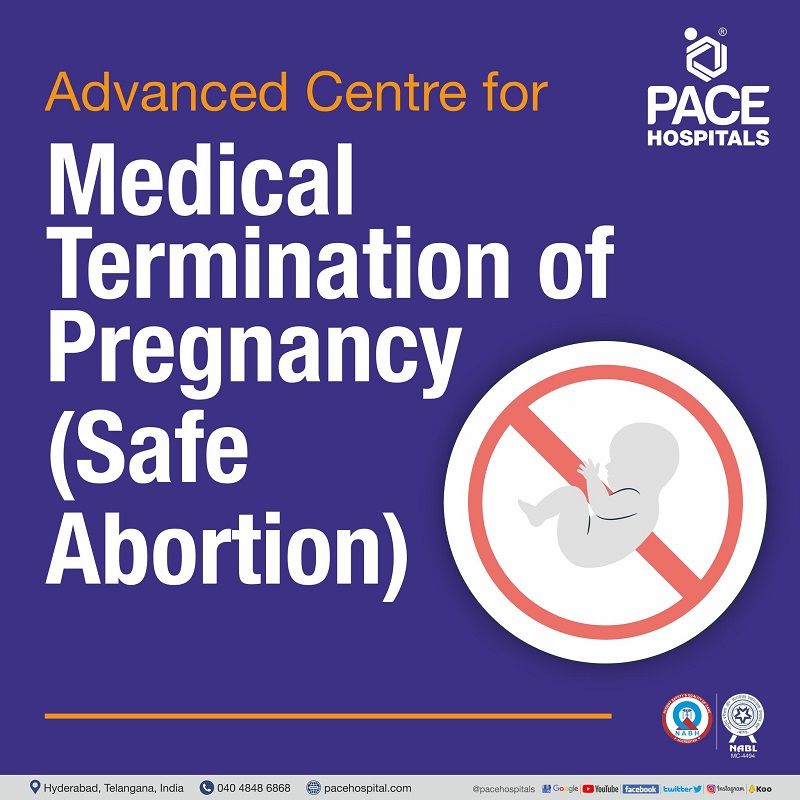
4500+ Safe Medical Abortion / MTP procedure
Equipped with next generation robotic surgery system
Team of the Best MTP doctors in Hyderabad 25 + years of expertise
CGHS, ECHS and All TPAs accepted for cashless treatment
What is MTP and its purpose?
MTP full form in medical - Medical Termination of Pregnancy
Medical termination of pregnancy (MTP) refers to a medical procedure used to terminate a pregnancy with the help of medications.
Medical abortion (drug-induced) is an option for women from the 7th week of their pregnancies and up to the 24th week (it varies depending on various scenarios). If a medically-assisted abortion fails to terminate a pregnancy or is incomplete (for whatever reason), surgical treatment will be necessary.
Medical termination of pregnancy is lawful in India (as per Medical Termination of Pregnancy Act No. 34 of 1971, 2002 and 2021), provided the pregnancy does not last more than 24 weeks, and only the consent of a pregnant woman is required to terminate the pregnancy. However, a minor girl or a woman who is mentally ill and unable to take rational decisions will require permission from their parent/guardian. Except for those in Jammu and Kashmir, this act applied to all citizens in India.
Causes of Medical Termination of Pregnancy / MTP indications
Medical Termination of Pregnancy - MTP definition
Medical termination of pregnancy is indicated if there is a presence of the following conditions:
- A woman who conceived accidentally (of any reason)
- A woman's health makes it dangerous to continue a pregnancy
- A Woman who needs completely remove an early miscarriage.
- Foetal abnormalities
The medical termination / MTP procedure for unmarried women with a gestation period of up to 24 weeks was not allowed earlier as per the Medical Termination of Pregnancy Act 2021. In September 2022, it was legalised by the Indian judiciary with a verdict that all women have equal rights to have a safe and legal abortion up to 24 weeks of gestation, regardless of their marital status.
Although abortion is a highly personal decision, the Indian government has enacted legislation to control illegal abortions. This measure is known as the "Medical Termination of Pregnancy Act."
Need for the Medical Termination of Pregnancy (MTP) Act
MTP meaning
In 1860, the British colonial government enacted the Indian Penal Code (IPC); according to articles 312-316 of the Indian Penal Code, "Inducing an abortion amounted to culpable homicide, and that any person performing it would be subject to imprisonment for three or more years and/or payment of a fine” with an exemption where an abortion can be performed if there is a life threat to the woman.
The existence of this Indian Penal Code led to the deaths of countless women who attempted abortions illegally (outside a hospital or care centres). This high mortality rate, along with the pressure of a growing population, prompted lawmakers to rethink the existing law as it was in 1971 and pass a new statute (a written law passed by a legislative body) to address the issues related to unsafe abortions. Thus, the Medical Termination of Pregnancy Act 1971 was framed.
Medical Termination of Pregnancy - MTP Act
Medical Termination of Pregnancy (MTP) Act 1971
The Medical Termination of Pregnancy Act 1971 came into force on 10th august 1971. It is framed to allow registered or licenced medical professionals to end certain pregnancies and handle any other issues related to the procedure.
The termination of pregnancy is allowed on the basis of a single registered obstetrician's opinion if the gestation period does not exceed twelve weeks, whereas if it exceeds more than 12 weeks and less than 20 weeks, it is good to take two registered obstetricians' advice. It is not allowed if it exceeds more than 20 weeks except in a few cases.
As per the Medical Termination of Pregnancy Act of 1971, a pregnancy may be terminated by a registered medical practitioner under the following provisions:
- The continuation of the pregnancy would threaten the pregnant woman's life or seriously hurt her physical or mental health, that includes rape or failure of any contraceptive (device or medication) that a married woman and her partner used to avoid pregnancy; or
- There is a significant probability that if the kid is born, it will be severely handicapped due to physical or mental defects.
In addition to this, According to Section 3 of the Medical Termination of Pregnancy (MTP) Act of 1971, the following need to be considered:
- When a doctor or other medical professional terminates a pregnancy in line with the law, they should not hold in violation (have or commit a crime) of any crime under the Indian Penal Code, 1860, or any other law in effect at the time.
- A minor girl (under age 18) and /or who is mentally ill or of unsound mind cannot get an abortion without the consent of her guardian or parent.
In the case where there is an immediate need for the termination in order to save a pregnant woman's life, the length of the pregnancy (less than 20 weeks) and the opinion from two obstetricians will not be applicable or mandatory.
This act expanded the indications for abortion, outlined the requirements for facilities and practitioners, and mandated training for obstetricians carrying out abortions.
No pregnancy terminations shall be performed under this act at places other than
- An established hospital or a hospital which is maintained by the government of India, or
- A place for the time being that the government has approved for the purposes of this act.
Medical Termination of Pregnancy Act 2002
In order to ensure better and more general implementation and expanded access for women, especially in rural areas, the Medical Termination of Pregnancy Act 1971 was revised in 2002, where a committee was set up by the government at the district level, with the Chief Medical Officer or District Health Officer as the committee's chairperson. In addition to the 1971 act, the district-level committee can approve additional places where a legal termination of pregnancy could be done.
Unfortunately, the act has not kept pace with advanced technology in foetal health diagnostics and abortion access for malformed foetuses (identifying foetal abnormalities).
In light of advancements in medical technology, such as genomics and ultrasonography, the MTP Act of 1971 and 2002 has become antiquated and inadequate in providing safe rights to women. A study was reported in 2015 where 1.56 crore abortions in India were reported, with 73% of those occurring in non-medical settings.
Medical Termination of Pregnancy Act 2021
The medical Termination of Pregnancy Act 2021 act is an amendment to the Medical Termination of Pregnancy Act 1971 and 2002 as there is an advancement in technology, where ultrasonography and genetics enabled the prenatal (before birth or during pregnancy) diagnosis of having a variety of foetal abnormalities. These abnormalities can be identified after 20 weeks gestation period due to a variety of scientific and biological reasons, thereby highlighting the necessity to raise the gestational limit for abortion (more than 20 weeks).
The Ministry of Health and Family Welfare has been pressured by the concerned medical professionals to amend the MTP Act and bring it in line with worldwide norms due to the increase in writ petitions requesting termination of pregnancy in cases of significant foetal defects. As a result, the MTP Act 2021 (which is currently law) substantially revises the MTP Act of 1971 and 2002. These changes have provided more time for obstetricians, gynaecologists, and other specialists in the field of foetal medicine to make accurate diagnoses of foetal abnormalities.
As per this, termination can be performed on a woman by a registered medical practitioner on the advice of one obstetrician for up to 20 weeks for women who had conceived due to the failure of any device or method used by her or her partner for the purpose of limiting or preventing pregnancy.
In cases of survivors of rape, victims of incest, minors, women with physical disabilities and women with a change of marital status during an ongoing pregnancy (widowhood and divorce), if the length of the gestation period is less than 20 weeks, the advice of one obstetrician is required, and in cases of more than 20 weeks and less than 24 weeks, a two obstetricians’ opinion is need to have a safe termination. For more than 24 weeks, the state-level medical board's opinion is required for the termination.
The members of the Medical Board shall consist of the following:
- Gynaecologist
- Paediatrician
- Radiologist or Sonologist
- Other members as may be notified in the State Government or Union territory's Official Gazette.
The termination shall not be subject to the restrictions with respect to the duration of the pregnancy by the medical practitioner when necessary due to the presence of the significant foetal abnormalities identified by a Medical Board.
Objective of Medical Termination of Pregnancy - MTP Act
The core objective of the Medical Termination of Pregnancy (MTP) Act was framed in its initial version (Act 1971). It states the following:
"An Act to provide for the termination of certain pregnancies by registered Medical Practitioners and for matters connected therewith or incidental thereto."
The objective focus on improving maternal health and reducing the mortality rate (death rate) in India caused by unsafe and illegal abortions. With this act, only certain pregnancies are allowed to be terminated by medical professionals.
Complications of Medical Termination of Pregnancy (MTP)
Possible complications of medical termination in pregnancy can vary depending on the type of technique used.
Medical termination:
- Incomplete abortion, which could necessitate a surgical abortion
- If the medical technique does not work, there will be a continuation of the pregnancy
- Serious complications such as heavy and prolonged bleeding
- Infection and increase in body temperature
- Discomfort in stomach
Surgical termination:
- Probability of cervical tear
- Uterine perforation
- Bleeding and infections
Contraindications of Medical Termination of Pregnancy (MTP)
Medical termination is a common procedure to have a safe abortion, but it is not an option for everyone. Women with the following conditions are not allowed to have a medical termination of pregnancy:
- Presence of an intrauterine device in the uterus
- In the case of ectopic pregnancy (pregnancy outside of the uterus)
- Presence of bleeding disorders, serious liver, lung and kidney disease, and seizures (uncontrolled)
- Intake of blood thinning agents or steroids
- Complications of the heart or blood vessel
- Presence of an allergy to the medications involved in the technique.
Preparing for Medical Termination of Pregnancy (MTP)
Before initiating a medical abortion, the healthcare provider would like to know the following:
- Overall medical and medication history of the pregnant women.
- Pregnancy confirmation by undergoing a physical examination.
- Request for an ultrasound exam to rule out ectopic (suspecting of having pregnancy outside the uterus) and molar pregnancy (development of tumour in the uterus).
- Request for urine and blood tests.
The obstetrician will explain the complete procedure, how it works, the side effects, and possible risks and complications.
The patient needs to understand the entire process and how the MTP kit / medication work, the risks and complications involved and should be clear on all questions or concerns, if any, before the start of the process. Also, the patient needs to sign the consent form as a token of acceptance to have a medical termination.
During Medical Termination of Pregnancy (MTP) procedure
This technique of abortion does not need anaesthesia as this is not a surgical procedure. This technique can be performed in clinics or in home premises under the supervision of an obstetrician or gynaecologist.
The obstetrician will be providing safe medications / MTP kit in combination through the oral or different route of administration. This regimen is approved by the Food and Drug Administration (FDA), and medicines are typically given within seven weeks from the first day of the last menstrual period. The obstetrician might prescribe medicines at different intervals.
Side effects of Medical Termination of Pregnancy (MTP)
Medical abortion pills are used in a medical procedure resulting in cramping and bleeding in the uterus. It's also possible that they could lead to the following:
- Vomiting sensation
- Increase in body temperature
- Chills
- Loose and more frequent bowel movements
- Headache
After Medical Termination of Pregnancy (MTP) procedure
The patients will be advised by the healthcare team that the occurrence of the following signs is expected after MTP, which may indicate a successful abortion.
- Severe abdominal pain
- Increase in body temperature that lasts more than 24 hours
- Presence of foul-smelling vaginal discharge
- Heavy bleeding
Following a medical abortion, the patient should visit their obstetrician to ensure adequate healing and to examine the uterine size, bleeding, and any signs of infection. In order to prevent the risk of having infections, the patient should not insert anything vaginally up to two weeks after an abortion.
The obstetrician may ask about the patient's feelings about pregnancy, the regularity of bleeding, and other such questions during the follow-up visit. An ultrasound and, maybe, a surgical abortion may be necessary if the obstetrician detects an incomplete abortion or continued pregnancy.
The obstetrician might suggest having a counselling session if the patient is feeling low, sad and having mixed emotions (guilty, embarrassed and stigmatised).
Advantages of Medical Termination of Pregnancy (MTP)
The advantages of medical termination of pregnancy include the following:
- Non-invasive procedure until it fails
- Safety and effective method for early pregnancy
- Done with privacy under medical supervision
Frequently asked questions:
What is medical termination of pregnancy (MTP)?
It is also known as "medical abortion" and refers to a method of terminating a pregnancy that employs the use of drugs rather than surgical intervention. A pregnant woman will be taking medication to stop the development of the foetus, and it is a safe and effective approach to terminating a pregnancy up to a specific period in pregnancy, typically within the first three to six months.
What happens if an MTP (medical termination of pregnancy) is done after 28 weeks?
Medical termination of a pregnancy after 28 weeks is considered "late-phase" and thus not a healthy suggestive for the mother. A 28-week gestation is more than half the foetal developmental stage (39-42 weeks), and the mother or woman are at high risk of having severe complications if she undergoes medical termination.
What are the key highlights of the Medical Termination of pregnancy (Amendment) Act, 2021?
The Medical Termination of Pregnancy (Amendment) Act 2021 was passed in Rajya Sabha on 16th March 2020 and Lok Sabha on 17th March 2020 and entered into force on 25th March 2021 with the goal of regulating the circumstances under which a pregnancy may be terminated.
The key highlights of the Medical Termination of pregnancy (Amendment) Act 2021 are:
- Under the act, a medical board (including a gynaecologist, paediatrician, radiologist or sonologist) must take the call on whether or not to terminate a pregnancy after 24 weeks if there are significant foetal abnormalities.
- The gestational cut-off for women has been raised by the act from 20 to 24 weeks.
- The length of the pregnancy should not be applied to the termination of pregnancy by a medical practitioner where such termination is indicated by the diagnosis of any of the significant foetal abnormalities determined by a medical board.
- Abortions on the recommendation of a single registered physician are legal under the act up to the twenty-week mark and between the twenty and twenty-four-week marks on two registered obstetricians' agreement.
- Pregnancy termination is legal only in extreme cases, such as when the mother's life is in danger, when birth control fails, when the foetus is malformed, etc.
Is the medical termination of pregnancy an ethical act?
Yes, medical termination of pregnancy is legal in India, under the supervision of medically qualified professionals and under the protection of the Medical Termination of Pregnancy Act, 2021 that allows abortions up to 24 weeks for certain women (increased from 20 weeks as per the previous act, 1971); these women include single and married women who have been divorced, widowed, rape victims, age less than 18 or women who are mentally ill.
However, for minors and the mentally ill, consent is required from the patient's guardian or parent.
What are the pros & cons of the Medical Termination of Pregnancy Act of 1971?
The Medical Termination of Pregnancy Act focused on enhancing maternal health and lowering the mortality rate (death rate) in India as a result of unsafe and illegal abortions. This act allows medical providers to terminate only certain pregnancies.
Pros:
- It frames certain guidelines to ensure safe abortion, especially in cases of foetal abnormalities.
- It aids in family planning to get an abortion within the first 12 weeks and 20 weeks of pregnancy either if contraceptive measures fail, leading to the conception or any harmful effects to women if she continues the pregnancy or the presence of substantial risk for the upcoming child (physical and mental abnormalities after birth).
- Abortion after 20 weeks is also permissible if a certified medical practitioner believes that emergency termination is essential to preserve the life of a pregnant woman.
- It also outlines circumstances that might cause serious harm to a woman's mental health for special category people such as rape victims.
Cons:
- All the rules under this act are constricted only to married women.
- Even for special vulnerable populations, like rape cases, the gestation limit for medical termination is 20 weeks.
How much does MTP cost in India?
MTP procedure cost in India ranges from ₹ 6,000 to ₹ 10,000 (INR six thousands to ten thousands) if performed through medications, in case of surgery cost of Medical Termination of Pregnancy (MTP) may vary from ₹ 28,000 to ₹ 35,000 (INR twenty-eight thousands to thirty-five thousands), depending upon the different hospitals in different cities.
What is MTP procedure cost in Hyderabad?
MTP cost in Hyderabad ranges from ₹ 5,000 to ₹ 9,000 (INR five thousands to nine thousands) if performed medically, in case of surgery required cost of MTP (Medical Termination of Pregnancy) may vary from ₹ 26,000 to ₹ 32,000 (INR twenty-six thousands to thirty-two thousands).
However, cost of Medical abortion depends upon the multiple factors such as type of the procedure, in case of surgery - selection of room for hospital stay and corporate, CGHS, EHS, ESI or insurance approval for cashless facility.

